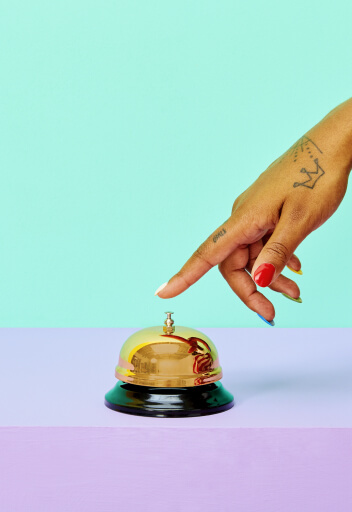A young man appears at a club in Ibiza, teeth glinting in the Balearic sun, gold trimmed, resplendent, perfectly quaffed hair, and his gravelly Geordie accent declaring
“I am the Ibiza final boss, Jack Kay”
WhatsApp groups are, suddenly, a hive of activity. The perfectly round, medieval bob, bright white teeth and sunglasses, combined with the confidence of someone who doesn’t just believe he is a main character, he knows he is.
The puns are incredible (DC1066), but beyond that, we start to wonder, who is Jack? Where’s he from? What does he do?
It quickly becomes apparent that everyone is trying to find out who he is, but there are no social profiles… Then, suddenly, one appeared, at the time with a single image of the boss himself.
Smart move. Since the original video, he now has over 100k followers.
What does the internet's latest overnight global superstar tell us about the state of marketing in 2025? In this article, I explore Generation Z's preparedness for online fame and how Ibiza has become even more commercial than we ever thought possible thanks to social media.
A marketer's dream in a marketer's paradise
I have a lot of love for Ibiza, but it has become a commercialised nightmare of the most epic proportions. As a fan of house and techno, and someone who has spent a lot of time there, my feelings towards the island are at odds with what I see online.
As a marketer, I have to admit it holds the playbook for some of the most incredible marketing you will ever see.
Unvrs is all over my Instagram feed this year. The hyperclub has taken over the cavernous old aircraft hangar that once housed Privilege. Unvrs has been built with visuals in mind, a canny move by owners, The Night League (who also own Hï Ibiza and Ushuaïa Ibiza).
The money invested in the club is there for all to see. This is Ibiza reaching new levels of commercial success. The experience of clubbing and the marketing on the island are now so intertwined that they are blurred beyond recognition. This is what "corporate rave simulation" looks like.
Clubbing in general has become a more visual experience because of social media. Nearly every night in Ibiza has a viral moment from one of the thousands of cameras pointing in all directions at any given time. Promoters are all too aware of this, so it is not unusual to see drones, professional videographers, and even camera crews bundling their way through crowds at these mega-raves.
A terrible side effect of this is the total lack of “vibe”. People just stand there gawping at the giant emotional robot on the screen behind the dj, pointing their camera at it. Worse, some people don't want to be filmed. This acute awareness of what's going on around you is a very modern clubbing experience.
The music is secondary. The commercial success of the night, strengthening the brand, and the marketing are what counts.
As attention spans wane, digital marketing adapts to it, and we explore new ways of reaching people and generating impressions. Going viral is a marketer's dream, but chasing algorithms has become a dark game in recent years.
In Ibiza, every year since COVID, we have seen bigger, bolder marketing strategies, with DJ's becoming the superstar influencers the big clubbing brands tend to pin their marketing campaigns (sorry, club nights) too.
Your emotions are the currency
This is what a lot of the music industry is now reliant on: viral campaigns and algorithm-friendly songs. A friend of mine told me about a recently planned viral video where they Shazamed songs at an Oasis concert.
The result “Oasis fans angered as gig-goer uses Shazam to identify one of the ‘greatest songs of all time’”
What pulls attention most? The same thing that made the tabloids so popular. Sensation, disgust, anger, outrage, hilarity. Emotions are currency; they take energy, and media feeds off it. The dopamine hit is addictive, and we are all hooked.
When we open Instagram, TikTok, Twitter (X) etc, we’re faced with an overflowing torrent of information, designed to push buttons.
What stands out? The things that elicit the strongest emotions.
Hate watching gets more engagement, that’s why DJs dressed as elephants get to play at Ushuai in 2025.
Popularity is driven as much by the people who don’t like something as much as by the ones who do.
If a social media post generates heated debate, it’ll rise to the top. It's why culture wars don’t go away. People will keep talking about something if it generates engagement and visibility.
Is Jack K the Hawk Tuah of 2025?
Whether intentional or not, and I’ll get onto that, Jack K’s meme-worthy final boss statement ticks all the boxes for the algorithm. The first video of him dancing, posted by Zero Six West, has clocked over 11 million views.
Their post:
“Does anyone know this absolute legend coz we’ve got two free guestlist with his name on it!"
The post has 256k likes on IG and 10’s of thousands of comments. There have been many more videos across different platforms, viewed millions of times.
The comments are dominated by jokes, all quite good-hearted, generating thousands of likes themselves.
There is even a meme coin launched.
So is Jack the new Hawk Tua, or did he orchestrate this moment?
Sort of.
The way this has exploded feels intentional, but there is a reason. I am a soon to be 40 year old Millennial. I remember life without the internet; I didn’t grow up with cameras when I went out.
We dressed weird, danced like no one was watching and let loose. We were our authentic selves, naturally, without fear of being judged, sometimes because we wanted to make a statement, but, at most, it was for our peers and the people near us.
I’ve used social media since Myspace in the mid-2000s, to promote music and events. I’ve seen how it has evolved, like many my age, I can step back from it and see the world without it.
Gen Z have known nothing but the internet and the ability to become rich and famous for doing literally nothing. They have always known social media, there isn’t a world without it. This is alien to me.
There is almost an expectation that if you have “main player energy”, you will be rewarded for it. Forget mastery, skill, artistry. Remember the TikTok House?! Basically a training centre for learning how to do nothing and be incredibly famous for it.
In a way, it is a natural evolution of reality TV, which often made celebrities of ordinary people. However, you had to actually get onto the show first. There were gatekeepers - Now all you need is a phone and a bit of confidence, and a thatched roof on your head.
Authenticity seems to be more about who you are on camera and how you portray yourself online. You either fear that and avoid doing anything that might make you stick out, or you fully embrace it.
The point is, there are more people “ready” for a viral moment, although I can’t get my head around the thought that you might genuinely want to become a meme.
How much money do Meme’s make?
But money talks, and this is capitalism. The opportunity to make a lot of money with little to no effort will always be appealing. And savvy marketers will always see an opportunity in someone or something’s potential to explode on the internet.
Hawk Tuah girl, Hailey Welch, is estimated to have made at least $500,000 from her 2024 viral video. She had her own podcast and contravercial meme coin.
Brands like Greggs and Currys have already jumped on the Ibiza Boss bandwagon, using his likeness to promote products on social media. Will LEGO be next?!
Gingerbread Man final boss https://t.co/qMADdTkJSW pic.twitter.com/MLkREDuaoy
— Greggs (@GreggsOfficial) August 6, 2025
This is reactive marketing done superbly well. Currys recently had Big Jon reviewing Bosch products using his signature catchphrase “BOSH”.
With inequality rising exponentially, social mobility also plays a big part in the explosion of people acting like they are the stars in a film. There is a sense that you are auditioning, 24/7, whether that's just for attention, potential fame and fortune, or maybe just because you run a small business, in 2025, it feels inescapable.
It is now a viable way to get on the housing ladder, a kind of personality lottery. Or is it just becoming a viable career?
How does the job title "professional meme" sound?
It is worth remembering, in all of this, that Jack and Hailey are real people. Perhaps because of the outlandish look Jack sports, there is a belief that he is up for standing out and being famous. I hope so, because brands are always going to want to cash in on this sort of celebrity no matter what the outcome.
While Hailey Welsh was embroiled in a Crypto scandal, she seems to have dealt with her sudden fame smartly.
I hope the Ibiza Final Boss makes a fortune from this, good for him. He did a funny catchphrase, had an unforgettable holiday, and the only thing we should judge is the social media platforms for commodifying EVERYTHING, including Ibiza.

